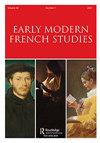Civic Pride and Royal Incorporation: Henri IV in Limoges
IF 0.2
3区 历史学
Q2 HISTORY
引用次数: 0
Abstract
This article examines an account of Henri IV’s entry ceremony into Limoges in 1605 that was written by Simon Descoustures, a local official and avocat du roi. I argue that this account opens up theoretical terrain on which to rethink narratives of royal power in early modern France. Henri IV’s royal entries have previously been understood as part of a broader effort to shore up his authority in the wake of the religious wars. In Descoustures’s text, however, while the people of Limoges welcome Henri IV into their city, they do so on their own terms, extending the spatial and temporal framework through which their encounter with the king takes place. By attending to the materiality of Limoges’s ancient origins and its enduring civic pride, I demonstrate how the city incorporates Henri IV into its civic body, rather than allowing itself fully to be subsumed into the king’s body politic.公民自豪感与皇室合并:亨利四世在利摩日
这篇文章考察了1605年亨利四世进入利摩日的仪式,这篇文章是由当地官员、当地人Simon Descoustures撰写的。我认为,这一描述为重新思考现代早期法国的王室权力叙事开辟了理论领域。亨利四世的王室作品此前被理解为在宗教战争后巩固其权威的更广泛努力的一部分。然而,在Descoustures的文本中,当利摩日人民欢迎亨利四世进入他们的城市时,他们按照自己的方式这样做,扩展了他们与国王会面的空间和时间框架。通过关注利摩日古老起源的物质性及其持久的公民自豪感,我展示了这座城市是如何将亨利四世融入其公民体系的,而不是让自己完全融入国王的政治体系。
本文章由计算机程序翻译,如有差异,请以英文原文为准。
求助全文
约1分钟内获得全文
求助全文
来源期刊

Early Modern French Studies
Multiple-
CiteScore
0.10
自引率
0.00%
发文量
14
期刊介绍:
Early Modern French Studies (formerly Seventeenth-Century French Studies) publishes high-quality, peer-reviewed, original articles in English and French on a broad range of literary, cultural, methodological, and theoretical topics relating to the study of early modern France. The journal has expanded its historical scope and now covers work on the sixteenth, seventeenth, and eighteenth centuries. Within this period of French literary and cultural history, the journal particularly welcomes work that relates to the term ''early modern'', as well as work that interrogates it. It continues to publish special issues devoted to particular topics (such as the highly successful 2014 special issue on the cultural history of fans) as well as individual submissions.
 求助内容:
求助内容: 应助结果提醒方式:
应助结果提醒方式:


